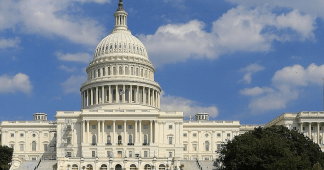By Nick Beams
The semi-annual Financial Stability Report issued by the US Federal Reserve last week has again illustrated how relatively small incidents in the increasingly fragile financial markets, based on speculation and masses of debt, can have significant consequences.
The latest report probed an incident in early August. Concerns over the direction of the US economy, provoked by a lower-than-expected jobs report and a minor increase in interest rates by the Bank of Japan, sent a tremor through global financial markets.
Debt was a significant factor in the market gyrations. The VIX index, sometimes referred to as Wall Street’s “fear gauge,” rose sharply.
The Fed report blamed the disturbance not so much on so-called yen carry trades, in which traders borrowed money in cheaper yen to invest on Wall Street. Rather “highly leveraged hedge funds” quickly sold off some of their holdings, with broad consequences.
“During this event,” the report said, “liquidity in the Treasury market, as well as in other markets deteriorated markedly, but market conditions rapidly improved following favourable data releases the following week. Nevertheless, this episode showed once again how high leverage can amplify adverse shocks.”
The Fed report noted that leverage, that is, debt, across hedge funds in the first quarter of this year was at or near its highest point since 2013 when it first started collecting this data.
Based on its contacts with Wall Street, the Fed said the chief concern in the financial system was the level of US government debt, now approaching $36 trillion, and centred on how long its escalation could be sustained. Other concerns were tensions in Middle East, and the possibility of a US recession.
It warned that the accumulation of government debt, and the issuing of more bonds to finance it, put upward pressure “on long-term interest rates that could further dampen growth and strain sovereign and private-sector borrowers.”
This could lead to a “sudden pull-back from risk-taking” and “declines in asset prices and losses for exposed businesses and investors, including those in the US.”
Others have outlined the conditions in financial markets more forcefully, as they focus on the escalation of US debt.
Kristina Hooper, the chief global market strategist at the financial firm Invesco, told the Financial Times (FT) that “2024 marks the first year in which the US spends more to service its debt than it spends on its defence budget. And that’s not sustainable in my opinion over the longer term, and so we have to worry about the potential for a mini Liz Truss moment.”
Hooper was referring to the events of September-October 2022 in the UK. The Tory government under the prime ministership of Truss sought to follow the US lead and finance major tax cuts for corporations and the wealthy by running up government debt. She quickly found out that the UK is not the US.
There was a massive sell-off of government bonds, sending up interest rates and threatening a major crisis in the financial system that was only averted by an intervention from the Bank of England. Truss was forced to quit.
The US has been able to do what Truss could not because the dollar is the global currency. But there are concerns about the dollar’s stability and that if confidence in it wanes to any significant degree the result will be more than a “mini” Truss moment.
Meanwhile, the speculative binge continues, fuelled by Trump’s declarations that he will further cut corporate and personal taxes, and, what is even more important, the limited regulations put in place to try to exert some control over finance capital are going to be eviscerated.
The instability is acknowledged in financial circles, but the speculation continues. As a leading official at one global asset management firm told the FT: “There are risks out there. But what is our biggest risk here? Missing out on the upside. The momentum is very strong.”
Bloomberg reported over the weekend that in financial markets as a whole the “everything mania” that greeted Trump’s election had been cooling somewhat as the effects of his policies, notably the impact of tariff hikes on the US economy, were considered.
“Yet on the speculative fringes, the risk-taking extravaganza isn’t just continuing—it’s getting bigger.”
It is being fuelled, at least in part, by discussion within the incoming Trump administration and the Republican party to give official support to crypto currencies and even making investments in bitcoin a “strategic reserve” as a way of paying down US government debt.
A recent article by contributing FT editor Brendan Greeley pointed out that the spike in bitcoin, it has reached over $90,000, after the election was based on circularity.
“Bitcoin is even more valuable because Trump will embrace it. Trump must embrace it because it is becoming more valuable.”
An FT article by Stephen Diehl, a software engineer and author of the book “Popping the Crypto Bubble,” was headlined “Bitcoin’s shift towards respectability should concern us all.”
There was a historical irony in the rise of bitcoin, he wrote. It was conceived of as peer-to-peer money, eliminating the need for financial intermediaries. But now it was primarily traded through funds managed by the very intermediaries it was meant to circumvent.
He noted that the collapse of FTX, the crypto exchange of Sam Bankman-Fried, in 2022 because of rising interest rates, appeared to sound crypto’s death knell.
“Yet here we are in 2024, witnessing what can only be described as a zombie-like reincarnation.”
There was a significant shift in the operation of the crypto market, however.
“The recovery is different from the last bitcoin high. It is fuelled by both individual investors and institutional money, with UK pension funds and City asset managers increasingly experimenting with exposure,” he said.
The involvement of the finance industry was “less a validation of its alleged revolutionary potential and more an attempt to extract fees from what is, essentially, gambling.”
The fundamental characteristics of crypto had not changed, it produced no cash flows had no intrinsic value, and its price movements were “overwhelmingly driven by retail sentiment.”
An even more frightening scenario loomed on the horizon, Diehl warned.
“Consider the next US administration, swept into power on a wave of deregulation promises. In this regulatory vacuum, we could witness things that make FTX’s misdeeds seem like mere child’s play.”
He warned that institutional players could create Byzantine packages with the result that the next “crypto winter,” and there would be, “could affect retirement savings and institutional portfolios in ways we’ve not seen before.”
We remind our readers that publication of articles on our site does not mean that we agree with what is written. Our policy is to publish anything which we consider of interest, so as to assist our readers in forming their opinions. Sometimes we even publish articles with which we totally disagree, since we believe it is important for our readers to be informed on as wide a spectrum of views as possible.












